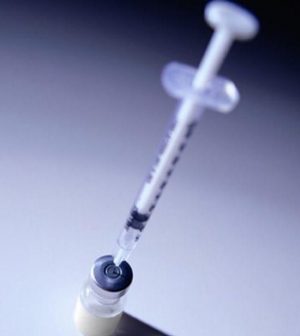- Recognizing the Signs of Hypothyroidism
- 10 Strategies to Overcome Insomnia
- Could Artificial Sweeteners Be Aging the Brain Faster?
- Techniques for Soothing Your Nervous System
- Does the Water in Your House Smell Funny? Here’s Why
- Can a Daily Dose of Apple Cider Vinegar Actually Aid Weight Loss?
- 6 Health Beverages That Can Actually Spike Your Blood Sugar
- Treatment Options for Social Anxiety Disorder
- Understanding the Connection Between Anxiety and Depression
- How Daily Prunes Can Influence Cholesterol and Inflammation
COVID-19 Vaccines Boost Antibodies, Even in People With Weak Immune Systems

COVID-19 vaccines trigger antibody production in most people who have weakened immune systems, but a new study reveals that their responses are weaker than in healthy people.
“Some of our patients have been hesitant about getting vaccinated, which is unfortunate because they are at increased risk of having more severe cases of COVID-19 if they happen to get infected, compared to those not taking immune-suppressing drugs,” said study co-author Dr. Alfred Kim, an assistant professor of medicine at Washington University in St. Louis.
His team studied 133 patients who were taking at least one immune-suppressing drug for illnesses such as inflammatory bowel disease, rheumatoid arthritis, spondyloarthritis, lupus and multiple sclerosis. They were compared with 53 healthy people.
For the study, blood samples were taken within two weeks before participants received their first dose of the Pfizer or Moderna vaccine and within three weeks after their second dose.
All patients kept taking their prescribed drugs, except for three whose medications were paused within a week of vaccination.
All of the healthy participants and 88.7% of participants with weakened immune systems produced antibodies against SARS-CoV-2 virus, researchers reported.
But antibody levels and the number of antibody-producing cells among those taking immunosuppressive medications were only about one-third those of the healthy participants.
The findings were published Aug. 30 in the Annals of Internal Medicine.
Kim said patients on immunosuppressants have various concerns about getting vaccinated.
“Some of them are worried that vaccination might cause their disease to flare, but we haven’t seen that happen,” he said in a university news release. “Others don’t see the point of vaccination, because they think the drugs they’re taking to treat their autoimmune condition will prevent them from producing an immune response to the vaccine.”
He said the study found a clear benefit of vaccination for most patients.
“What we found here is that the vast majority of immunocompromised patients with autoimmune diseases are able to mount antibody responses following COVID-19 vaccination,” Kim said.
The U.S. Centers for Disease Control and Prevention recently recommended that people taking immunosuppressant drugs receive a third mRNA vaccine dose, to strengthen their immune response.
Kim said researchers plan to follow the same group as they receive their booster shots, which may improve their immune system response.
“It’s really important for people who are immunocompromised to receive this dose to maximize their ability to protect themselves from SARS-CoV-2,” he said.
More information
The U.S. Centers for Disease Control and Prevention has more on COVID-19 vaccines and immunocompromised people.
SOURCE: Washington University School of Medicine in St. Louis, news release, Aug. 30, 2021
Source: HealthDay
Copyright © 2026 HealthDay. All rights reserved.










